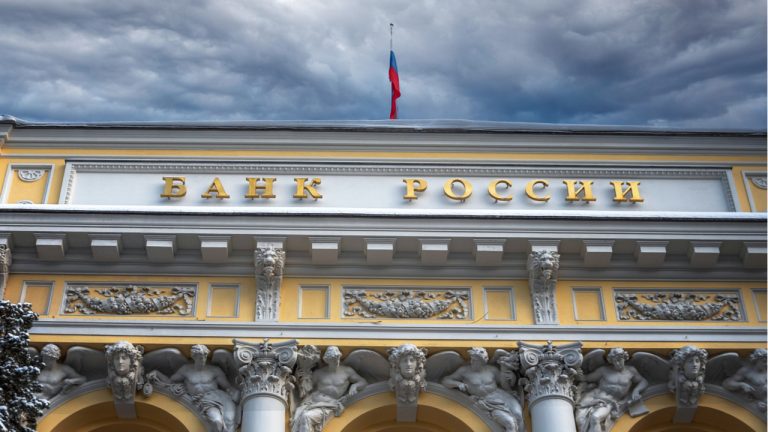
Digital assets manager CoinShares says that institutional crypto investors poured billions in capital into digital asset products last week in anticipation of further interest rate cuts. In its latest Digital Asset Fund Flows report, CoinShares says that institutional crypto investment products saw a surge in inflows to the tune of $1.2 billion last week. “Digital asset […]
The post $1,200,000,000 Flows Into Institutional Crypto Products Amid Further Expectations of Dovish Fed: CoinShares appeared first on The Daily Hodl.

Bitcoin products took the largest share of inflows, netting 84% of incoming funds, according to CoinShares’ weekly fund flows report.
Crypto investment products have recorded four weeks of inflows, as the market eagerly awaits the possible approval of a spot Bitcoin (BTC) exchange-traded fund (ETF) in the United States.
Asset management firm CoinShares’ Oct. 23 fund flows report revealed $179 million was added to digital asset investment products in the week ending Oct. 20, which has swelled the space’s assets under management to $33 billion.
Of the past week’s inflows, $55.3 million or 84% went to Bitcoin investment products which has brought year-to-date Bitcoin product inflows to $315 million, it added.
It seems that the anticipation of a spot #Bitcoin ETF has prompted further inflows for the 4th consecutive week. Here is our analysis with @Jbutterfill.
— CoinShares (@CoinSharesCo) October 23, 2023
Week 43 inflows: US$66m
Inflows are relatively low in comparison to June’s @BlackRock announcements, suggesting more… pic.twitter.com/6AkDGQJVOh
CoinShares Head of Research James Butterfill however noted that the recent week’s inflows still haven’t reached the levels seen earlier this year when BlackRock first filed for a spot Bitcoin ETF.
“While the most recent inflows are likely linked to excitement over a spot Bitcoin ETF launch in the U.S., they are relatively low in comparison to the initial inflows following BlackRock’s announcement in June.”
Butterfill added thaJune’s four-week inflow run saw $807 million enter the sector and the lower inflows recently “are indicative of investors adopting a more cautious approach this time.”

Meanwhile, Solana (SOL) products caught the second-largest share of inflows last week and the largest of all altcoins, netting $15.5 million. Ether (ETH) products saw outflows of $7.4 million — the only altcoin to suffer outflows last week.
Related: Bitcoin ETF to trigger massive demand from institutions, EY says
More recently, interest in a spot Bitcoin ETF surged late on Oct. 23 amid “positive signs” that BlackRock’s ETF was a step closer to approval and a U.S. Appellate Court issued a mandate to the Securities and Exchange Commission to review Grayscale’s spot Bitcoin ETF filing.
The moves sparked a Bitcoin rally which saw it gain 14% over the past 24 hours and briefly hit $34,000 for the first time since May 2022.
The price jump also saw over $193 million in Bitcoin short liquidations in the past 24 hours, according to CoinGlass data.
Magazine: Web3 Gamer: Minecraft bans Bitcoin P2E, iPhone 15 & crypto gaming, Formula E

Solana has seen steady inflows over the last nine weeks, even as other crypto investment products have faced outflows over a similar period.
Solana (SOL) investment products clocked $26 million worth of inflows since the start of 2023, outpacing all other altcoins including Ether (ETH), suggesting it's the “most loved altcoin amongst investors” according to CoinShares.
In a Sep. 4 Digital Asset Fund Flows weekly report, CoinShares' head of research James Butterfill noted that trading volumes for crypto investment products for the week ending Sep. 1 were 90% above the year-to-date average — with crypto product outflows dropping to $11.2 million.
It marks a seven-week run of negative sentiment that’s seen $342 million leave crypto products over that time but YTD, investment products remain net inflow positive at $165 million.

The outflows haven’t affected Solana products however, which saw weekly inflows of $700,000 — the ninth straight week in a row with inflows of $14.1 million over that time and YTD inflows of $26 million.

Bitcoin (BTC) products were the only other asset to see weekly inflows, totaling $3.8 million, while Short BTC, Polygon (MATIC) and ETH products all recorded weekly outflows.

Solana’s inflows come amid a streak of recent positive developments related to the network.
On Sep. 1, MakerDAO co-founder Rune Christensen submitted a proposal to build the project’s upcoming native chain off a fork of Solana’s codebase, despite its long-held ties to Ethereum.
Related: Bitcoin ETF applications: Who is filing and when the SEC may decide
On Aug. 23 it was reported that Shopify added the Solana-based payment network Solana Pay to its payment options — starting with the stablecoin USD Coin (USDC).
The Solana network has also seen some performance and reliability improvements, with only one outage in 2023 so far.
SOL’s price is up around 95.5% YTD but has traded mostly sideways around $20 to $25 since mid-January. It was trading at around $19.5 as of 12 am UTC Sep. 5 according to Cointelegraph data.
However, SOL is down 92.5% from its November 2021 all-time high of nearly $260.
Magazine: BitCulture: Fine art on Solana, AI music, podcast + book reviews
 A new study on digital currency-related lawsuits since 2018 shows a 42% increase in crypto lawsuits in 2022. The highest number of claims in a single year was recorded last year, with 41 total claims in the United States. The research also shows that the majority of lawsuits came from the U.S. Securities and Exchange […]
A new study on digital currency-related lawsuits since 2018 shows a 42% increase in crypto lawsuits in 2022. The highest number of claims in a single year was recorded last year, with 41 total claims in the United States. The research also shows that the majority of lawsuits came from the U.S. Securities and Exchange […]
Block Earner CEO Charlie Karaboga said it was a “disappointing outcome” given it had spent “considerable resources” to adhere to existing guidelines.
The CEO of fintech firm Block Earner has lashed out over the “lack of clarity” in Australia’s financial licensing regime after his company was sued by the country’s financial services regulator for providing unlicensed crypto-based investment products.
The Australian Securities and Investment Commission (ASIC) announced on Nov. 23 local time that it started civil legal proceedings against the company because it offered three crypto-linked fixed-yield earning products without an Australian Financial Services (AFS) license.
ASIC stated that the products should have been licensed as they were “managed investment schemes” where investors contribute money that is pooled together for an interest in the scheme.
The products, named “Crypto Earner”, “USD Earner” and “Gold Earner,” offered yields through users depositing Australian dollars that would be converted to Bitcoin (BTC), Ether (ETH), USD Coin (USDC) or PAX Gold (PAXG) depending on the product according to Block Earner’s website.
The crypto-assets are then lent to borrowers on Decentralized Finance (DeFi) protocols Aave (AAVE) and Compound Finance (COMP) to generate yield for the product.
ASIC Deputy Chair Sarah Court aired her concern that Block Earner offered the products without “appropriate registration” or an AFS license that she claimed left “consumers without important protections,” adding:
“Simply because a product hinges on a crypto-asset, does not mean it falls outside financial services law.”
In an emailed statement to Cointelegraph Block Earner CEO and co-founder, Charlie Karaboga, said although the firm “[understands] the backdrop” it was a “disappointing outcome.”
He said it welcomes regulations, claiming the firm “spent considerable resources building regulatory infrastructure” to be able to offer services “under existing guidelines provided by ASIC.”
Related: FTX Australia’s license suspended as 30K Aussies left in the lurch
Karaboga took aim at the unclear regulatory environment for crypto in the country and said the “lack of clarity [...] creates friction between regulators and innovators,” adding:
“In an ideal world, we would build these products in a regulatory sandbox with more clarity around licensing regimes. In the future, we look forward to working with ASIC and other regulators in this space.”
According to Karaboga, Block Earner had filed for a credit license and advised ASIC it would apply for an AFS license for its upcoming products as “the licensing requirements are clear.”
ASIC has previously given a warning to crypto-asset providers in the country after it took action against the creators of the Qoin token.
It said its “key priority” is targeting “unlicensed conduct and misleading promotion of crypto-asset financial products” after it alleged the Qoin token creators were “misleading” its users.

The chair of Australia’s market regulator has warned that “action will be taken” on financial product issuers who promote risky products to a wide consumer base.
Australia’s financial services and markets regulator has issued another glaring warning towards issuers of crypto-based financial products, particularly those inappropriately marketing high-risk products.
Joe Longo, chair of the Australian Securities and Investment Commission (ASIC) in an opening speech at the ASIC annual forum on Nov. 3 local time said it will use current laws to police “risky and complex products” to protect consumers.
He added, “crypto and the crypto ecosystem continue to pose challenges and opportunities for regulators and policymakers alike” saying the risks with crypto investing are “often opaque” with the assets being “highly volatile, inherently risky, and complex.”
While his warning encompassed non-crypto-focused firms too, Longo took particular aim at issuers of crypto-based financial products, putting them on notice if their offering doesn’t pass ASICs muster:
“Too often, issuers are seeking to market high-risk and niche investment products, including in some cases crypto-based products, to a very wide range of consumers.
We’re seeing issuers promoting high-risk products as appropriate investments that will make up a significant portion of an individual consumer’s investment portfolio. This will not be tolerated and action will be taken," he warned.
Longo said ASIC is continuing to use rules enacted in Oct. 2021 for financial products to have stricter target market determinations (TMDs) and disclosures of significant dealings outside of those TMDs to police “risky, volatile, and complex products.”
ASIC recently used these powers on Oct. 17, halting three cryptocurrency-related funds set to be offered to retail investors, due to non-compliant TMDs saying to Cointelegraph that they were “too broad [...] given the volatility and speculative nature of crypto markets.”
Longo took a seemingly softer approach towards blockchain and asset tokenization technology, noting it as having the potential to “provide new solutions to longstanding problems” and “revolutionize the way we do commerce.”
He noted the regulators' work supporting the pilot of a local Central Bank Digital Currency (CBDC) saying ASIC is monitoring developments of the pilot and how it will respond and adapt, adding:
“While encouraging digital innovation, ASIC will act to disrupt and deter conduct that harms people. Harmful conduct that falls within our jurisdiction, including unlicensed conduct and misleading promotion of crypto-asset financial products, is within our sights.”
Related: Saying ‘not financial advice’ won’t keep you out of jail: Crypto lawyers
At a panel on cryptocurrency later in the day, Longo said crypto “the capacity for consumer and investor harm is really, really significant” when trading digital assets and reiterated the difference between crypto and blockchain technology:
“My central message for consumers is that this is a risky, speculative, and poorly understood activity, which has to be distinguished from the innovation of the underlying technology.”
Longo said that crypto brings together “key issues that ASIC is interested in: technology, innovation, and new challenges for regulation.”
He spoke on the three “cornerstones” of ASICs crypto regulation strategy which are supporting the development of a regulatory framework and greater legal clarity for crypto and gathering information from international peers to inform the government on an effective legal framework along with continuing to disrupt and deter scams involving crypto.
 Swiss fintech firm Leonteq has introduced its digital asset products in two neighboring jurisdictions, Germany and Austria. The company is launching its crypto offering with the help of a Frankfurt-based bank and in response to interest from institutional and private investors. Leonteq Provides German and Austrian Investors With Exposure to Major Cryptocurrencies Leonteq is presenting […]
Swiss fintech firm Leonteq has introduced its digital asset products in two neighboring jurisdictions, Germany and Austria. The company is launching its crypto offering with the help of a Frankfurt-based bank and in response to interest from institutional and private investors. Leonteq Provides German and Austrian Investors With Exposure to Major Cryptocurrencies Leonteq is presenting […] Russia’s central bank has examined three platforms offering crypto-related services. The projects have been tested in its regulatory sandbox in the course of 2020. Bank of Russia has received dozens of requests to pilot various financial services since it created the closed regulatory environment around three years ago. CBR Pilots 3 Crypto Projects in 2020 […]
Russia’s central bank has examined three platforms offering crypto-related services. The projects have been tested in its regulatory sandbox in the course of 2020. Bank of Russia has received dozens of requests to pilot various financial services since it created the closed regulatory environment around three years ago. CBR Pilots 3 Crypto Projects in 2020 […]